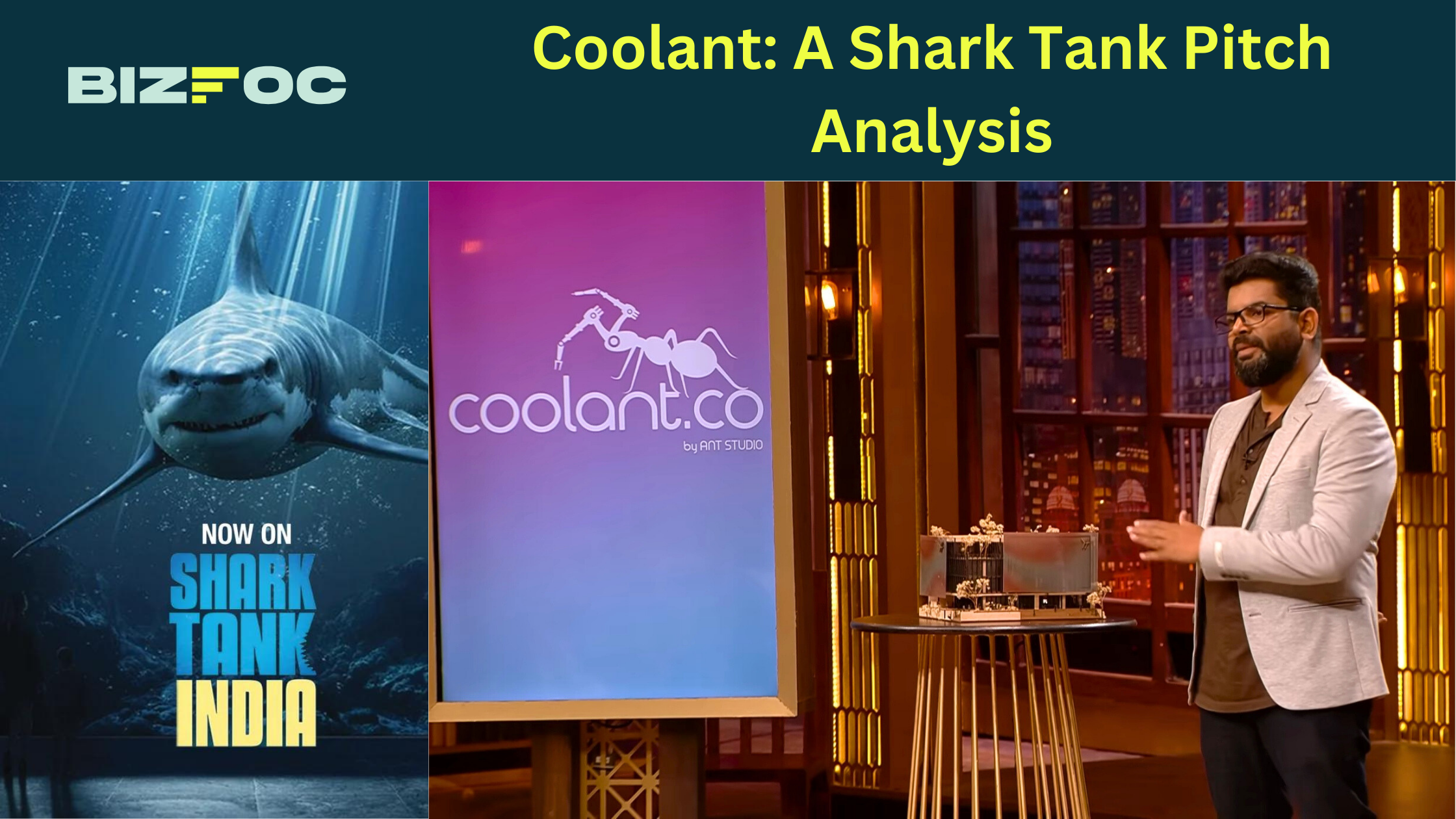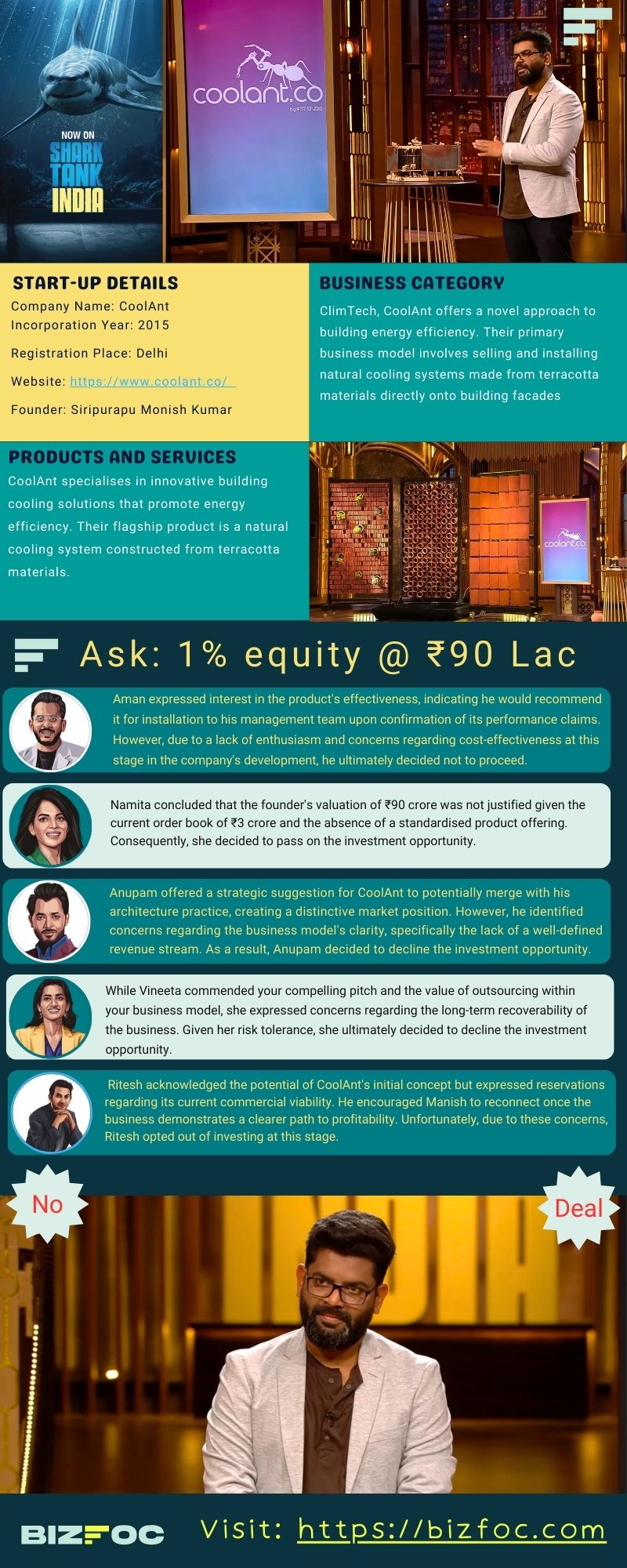
CoolAnt seeks to take a comprehensive approach to the need for thermal comfort. If it can integrate the most recent developments in material science and technology with their conventional systems, the possibilities are enormous.their procedures are meticulously and deliberately planned to minimize environmental effects throughout and after the product's life cycle, as well as during manufacture. They aim to supply the world with CoolAnt, a simple solution built by the earth that is both effective and elegant, similar to how ants work with the soil to construct beautiful ant mounds that are sophisticated and climate-sensitive. Future generations will find that solutions like personal cooling and building envelope cooling are revolutionary. They pitched their business model in the 44th episode of Shark Tank India Season 3.
CoolAnt has the Company named ANT STUDIO PRIVATE LIMITED with a COMPANY incorporation date of 29 April 2021. This Company is registered in Delhi, India, with an authorized capital of ₹15 Lakhs and a paid-up capital of ₹1.03 Lakhs. Through collaborations, Coolant is a social enterprise that focuses on reducing global warming and energy consumption to a great extent.
| Airing time | Shark Tank Season 3: Episode 44 |
| Brand | CoolAnt |
| Company Name | ANT STUDIO PRIVATE LIMITED |
| Company Registration | Delhi, India |
| Company Incorporation Date | 29th April 2021 |
| Business Category | Sustainable manufacturing |
| USP | Biomimetic building facade cooling systems |
| Co-founders/Directors | Monish Kumar Siripurapu And Vijaylakshmi Siripurapu |
| Company Authorized capital | ₹15 Lakhs |
| Company Paid-up capital | ₹1.03 Lakhs |
| Website | https://www.coolant.com/ |
| Sales/EBITDA/Profits |
Sales: FY 23-24: Gross:₹1.1Cr (till November) Net:₹84 Lakhs(till November) Projected by the end of FY 23-24: ₹2 Cr EBITDA: Cash Burn of ₹20 Lakhs |
| Unit Economic | N/A |
| Business valuation Ask | ₹90 Lakhs for the equity of 1% at the business valuation of ₹90 Cr |
| Pre-round | N/A |
| Deal pakki? | No deal Made |
COOLANT was co-founded by Monish Kumar Siripurapu and Vijaylakshmi Siripurapu. He completed his study of architecture at the School of Planning and Architecture, New Delhi. He developed this project back in 2015. The owner also owns an architecture practice which is running separately.
The major business that the company generates is through their foil building envelopes which are sold to mainly builders by modularizing according to the sun direction, ventilation, and needs of customers, which can be installed in building facades.
COOLANT specializes in handcrafted products including pots which are open-sourced to be used by anyone and to provide ease of accessibility to themselves also along with the modularized foil building envelopes which are developed using Computational Fluid Dynamics (CFD) and Aerodynamics having water holding capsules, both used for providing cooling in the buildings. A piece of detailed information about their services can be found at: Detailed information about their services can be found at: https://www.coolant.com/.
CoolAnt presented their pitch in Shark Tank India seeking an investment of ₹90 Lakhs for the Equity of 1% at a business valuation of ₹90 Cr.
As no sharks were convinced to collaborate with the business, the founders were able to make no deal.
The Sharks' decisions reflect several key considerations for CoolAnt:
Strengths:
Weaknesses:
The future of COOLANT rests on the founders if they are willing to merge CoolAnt and the architecture practice to establish a unique identity and try to raise capital after achieving acceptable sales which will be considerable for any investor to look forward to doing business with them and also rethinking about the measures to get quality standards and making them believable.
Following a pitch, COOLANT, was able to attract the interest of Sharks into the business, but throughout the pitch, after pointing out the key highlights of the business model, Sharks were concerned about the valuation of the business and its growth trajectory and hence, founders were not able to crack any deal.
